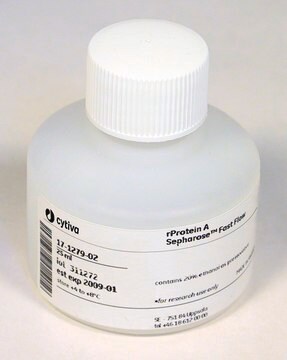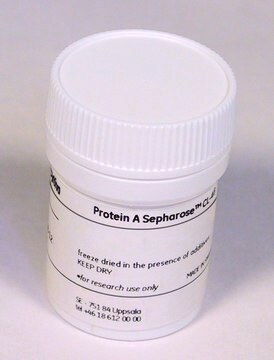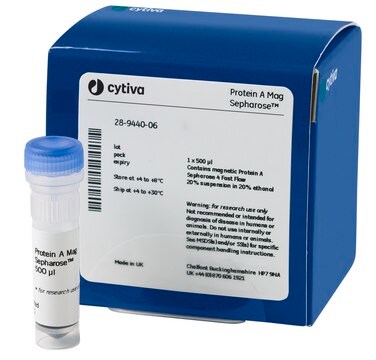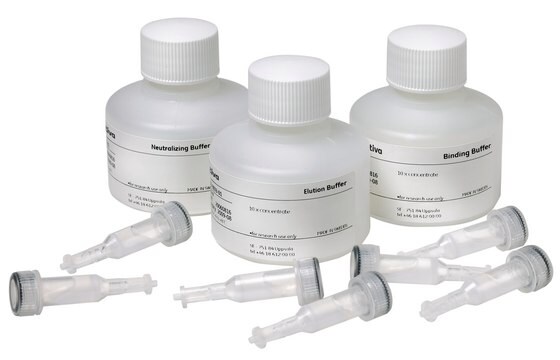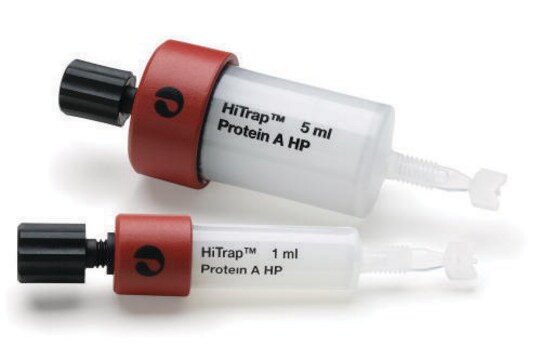GE17-5280-01
nProtein A Sepharose™ 4 Fast Flow
Cytiva 17-5280-01, pack of 5 mL
Synonym(s):
Sepharose 4 Fast Flow
About This Item
Recommended Products
ligand
native protein A (S. aureus)
packaging
pack of 5 mL
manufacturer/tradename
Cytiva 17-5280-01
storage condition
(20% Ehtanol)
matrix
4% cross-linked agarose
average diameter
90 μm (d50v)
cleaning
2-10
working range
3-9
capacity
>30 mg binding capacity(human IgG/ml)
suitability
suitable for bioprocess medium
storage temp.
2-8°C
Related Categories
General description
nProtein A Sepharose™ 4 Fast Flow is native protein A coupled to the well established Sepharose™ 4 Fast Flow base matrix. The native protein A ligand is produced by fermenting a selected strain of Staphylococcus aureus. The purified protein is coupled to the cross-linked 4% agarose base matrix by the cyanogen bromide technique, giving a highly stable medium with minimal non-specific adsorption. nProtein A Sepharose™ 4 Fast Flow is manufactured without using animal-derived components.
nProtein A Sepharose™ 4 Fast Flow has nearly twice the total IgG binding capacity of Protein A Sepharose™ CL-4B, and is suitable for recovery and purification of monoclonal antibodies from cell culture at both laboratory and process scale. nProtein A Sepharose™ 4 Fast Flow was developed and tested in co-operation with leading manufacturers of purified monoclonal antibody products, and is used in routine commercial production.
As member of the BioProcess media range, nProtein A Sepharose™ 4 Fast Flow meets industrial demands with security of supply and comprehensive technical and regulatory support.
Features and Benefits
- Replaces Protein A Sepharose™ 4 Fast Flow, the first Cytiva Protein A medium for large-scale purification of antibodies.
- Used in routine commercial production of monoclonal antibodies
- Free from animal-derived components.
Storage and Stability
Analysis Note
Legal Information
signalword
Warning
hcodes
Storage Class
3 - Flammable liquids
Choose from one of the most recent versions:
Certificates of Analysis (COA)
It looks like we've run into a problem, but you can still download Certificates of Analysis from our Documents section.
If you need assistance, please contact Customer Support.
Already Own This Product?
Find documentation for the products that you have recently purchased in the Document Library.
Customers Also Viewed
Articles
This page shows various purification options for Protein A Sepharose chromatography media and describes typical binding and elution conditions for Protein A Sepharose chromatography media.
This page describes immunoprecipitation (immunoaffinity or pull-down techniques).
This page describes efficient column packing and preparation for affinity chromatography of antibodies.
Desalting at laboratory scale is a well-proven, simple, and fast method that will rapidly remove low molecular weight contaminants at the same time as transferring the sample into the desired buffer in a single step.
Protocols
This page provides information about different pull-down assays for the further isolation of multiprotein complexes to identify their components with products from Cytiva.
This page shows how to convert between linear flow and volumetric flow rates in affinity chromatography.
This page shows how to perform column packing and preparation for affinity chromatography when using Tricorn™ or XK columns available from Cytiva.
Related Content
Pull-down assays, reagents, and protocols for investigating in vitro protein-protein interactions using affinity or GST pull-down, tandem affinity purification (TAP), and co-immunoprecipitation methods.
Our team of scientists has experience in all areas of research including Life Science, Material Science, Chemical Synthesis, Chromatography, Analytical and many others.
Contact Technical Service
